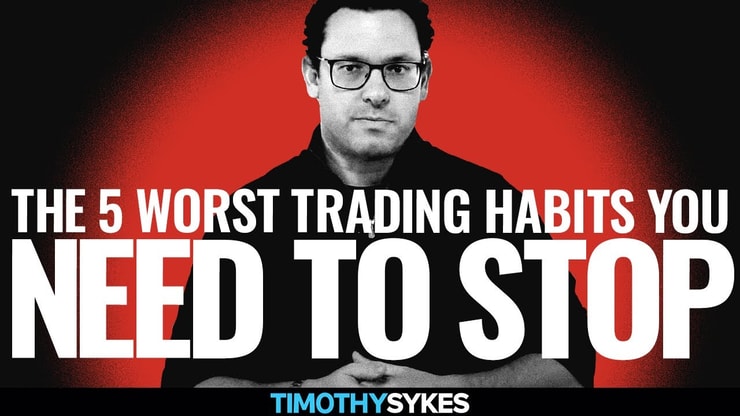Learning how to day trade for a living revolves around implementing day trading strategies into an overall strategy. The biggest part is protecting your capital — there’s nothing so dangerous to aspiring career day traders as not paying attention to risk!
Day trading for a living is one of the hardest things in the stock market to get results in…
Successful day trading requires effective risk management and emotional control. Risk management techniques and emotional discipline are a big reason that day traders get the confidence to go full-time. By managing risk and controlling emotions, you can mitigate potential losses and stay focused on long-term success.
Curious to learn how my 31 millionaire students and I day trade for a living? Read on!
Table of Contents
What Is Day Trading?

Day trading is a fast-paced, high-risk, high-reward form of trading where traders buy and sell stocks within a single trading day.
The goal? To profit from short-term price fluctuations. With the right strategies and discipline, it can be a profitable venture.
Day trading changes when you have a small account. Small account trading can be a great way to start your day trading journey, especially if you’re working with limited capital. It allows you to learn the ropes of the market without exposing yourself to significant financial risk. If you’re interested in learning more about this, check out this detailed guide on small account trading. It provides valuable insights that can help you navigate the market effectively.
Benefits of Day Trading for a Living
Day trading for a living offers a level of freedom that few other careers can match. You can work from anywhere, set your own hours, and the income potential is, in theory, unlimited. But remember, with great freedom comes great responsibility. You’re your own boss, and your success depends entirely on your decisions.
I LOVE taking the laptop lifestyle to new heights (or depths LOL) #workfromanywhere pic.twitter.com/U2EEuqVgyr
— Timothy Sykes (@timothysykes) January 20, 2019
Challenges of Day Trading for a Living
Day trading isn’t all sunshine and rainbows. It’s a high-stress job that requires constant focus, discipline, and a solid understanding of the markets. Emotional control is key. You’ll face losses – that’s a given in trading. But it’s how you handle those losses, and learn from them, that will define your trading career.
Getting Started with Day Trading
Getting started with day trading requires a solid foundation and understanding of the basics. First and foremost, educate yourself on the principles of day trading, including market dynamics, technical analysis, and risk management. Numerous online resources, courses, and books can help you gain the necessary knowledge. Additionally, consider joining trading communities or finding a mentor who can provide guidance and support.
Once you have a good grasp of the fundamentals, choose a reliable brokerage that offers suitable trading platforms and tools. Look for a brokerage with competitive fees, fast order execution, and a user-friendly interface. It’s also important to consider the quality of customer support, as you may need assistance in resolving any trading-related issues.
After setting up your trading account, develop a well-defined trading plan that outlines your objectives, strategies, and risk management rules. This plan should include your preferred trading timeframes, the types of securities you will trade, and the maximum amount of capital you are willing to risk per trade. By establishing clear guidelines, you can approach day trading with discipline and minimize the impact of emotional decision-making.
More Breaking News
- Credo Technology Unveils AI Innovation and Announces 3M Partnership
- Robinhood Appointed Trustee for Trump Accounts, Stock Rises
- Bitfarms Plans for U.S. Redomiciliation and Debt Repayment Spark Investor Interest
- HIMS Stops Compounded Pill Amid Legal Threats
Educate Yourself on the Basics of Day Trading
Before you dive into the deep end, you need to understand the basics of day trading. Read books, take courses, join trading communities. Knowledge is power, and in the world of day trading, it’s your first line of defense against costly mistakes.
If you want to master this technique, read my comprehensive guide on day trading. It provides a wealth of information that can help you become a self-sufficient day trader.
Find the Right Brokerage and Platforms
Choosing the right broker is crucial. Look for low commission fees, robust trading software, and responsive customer support. And don’t forget about account minimum balance requirements – you don’t want to be caught off guard by those.
Set Up Your Trading Processes and Rules
Day trading isn’t a guessing game. It’s a disciplined process of identifying opportunities, managing risks, and executing trades. Develop a trading plan and stick to it. Set your target profit and stop-loss levels for each trade, and never let emotions dictate your decisions.
Fund Your Account and Allocate Capital Appropriately
Capital allocation is a key aspect of risk management in day trading. Don’t put all your eggs in one basket. Diversify your positions and never risk more than a small percentage of your trading capital on a single trade.
Develop Your Own Strategies and Systems
There’s no one-size-fits-all strategy in day trading. What works for others may not work for you. Experiment with different strategies, learn from your successes and failures, and over time, develop a trading system that suits your risk tolerance and trading style.
Before you do anything, you’ll need to learn the basics of day trading, which can provide a solid foundation for your strategies. If you’re looking for a resource to help you with this, check out this guide on day trading basics. It offers a comprehensive overview of the fundamental concepts and techniques used in day trading, which can be invaluable in shaping your own trading strategies.
Analyzing the Market & Identifying Opportunities

Successful day trading relies on the ability to analyze the market and identify profitable opportunities. Technical analysis plays a vital role in this process. Learn to read and interpret price charts, identify key support and resistance levels, and use various technical indicators to gain insights into market trends and potential price reversals. Additionally, keep an eye on trading volumes and patterns to spot signs of market strength or weakness.
In addition to technical analysis, fundamental analysis can provide valuable insights into the underlying factors that can influence a stock’s price. Stay updated on company news, earnings reports, economic data, and industry trends. By combining technical and fundamental analysis, you can make more informed trading decisions and increase your chances of success.
It’s also important to develop a systematic approach to identifying trading opportunities. Define your entry and exit criteria based on your chosen strategies. Look for patterns, breakouts, and other signals that align with your trading plan. Be patient and wait for high-probability setups that meet your predefined criteria. Avoid impulsive trades based on emotions or market noise.
Technical Analysis & Chart Reading Basics
Technical analysis is the bread and butter of day trading. It involves analyzing price charts and using indicators to predict future price movements. Understanding support and resistance levels, trend lines, and chart patterns is crucial for identifying trading opportunities.
Fundamental Analysis & Research Resources
While day traders primarily use technical analysis, don’t underestimate the power of fundamental analysis. Company news, economic events, and market data can all impact stock prices. Stay informed and use this information to complement your technical analysis.
Identify Trends, Support/Resistance Levels, Reversals & Breakouts

The ability to read market trends and identify key price levels is a vital skill for day traders. Look for trend reversals and breakouts as potential trading opportunities. But remember, trends can be deceptive. Always use stop-loss orders to manage your risk.
How Much Can You Make Day Trading?
The million-dollar question, right? Well, the truth is, it varies. Some day traders make thousands a day, others struggle to break even. Your profits will depend on your skills, strategies, and a bit of luck. But remember, day trading is not a get-rich-quick scheme. It requires hard work, discipline, and continuous learning.
What do Day Traders Usually Trade?
Day traders trade a variety of financial instruments, from stocks and ETFs to futures and forex. The choice depends on your trading style, risk tolerance, and market knowledge. But for beginners, it’s often recommended to start with stocks. They’re less volatile than forex and easier to understand than futures.
Things to Know Before Day Trading for a Living
Before diving into day trading as a full-time endeavor, there are several essential factors to consider. First, understand that day trading is a challenging profession that requires dedication, discipline, and continuous learning. It may take time to develop the necessary skills and consistently generate profits. It’s advisable to start day trading while maintaining another source of income or savings to provide financial stability during the learning phase.
Managing risk is paramount in day trading. Set realistic expectations and avoid risking a significant portion of your trading capital on any single trade. Establish strict risk management rules, including stop-loss orders to limit potential losses. By protecting your capital and managing risk, you can ensure longevity in the trading business.
Finally, develop a resilient mindset and emotional control. Day trading can be stressful, and emotions can interfere with rational decision-making. Be prepared to handle both wins and losses with composure. Maintain a positive attitude and embrace trading as a continuous learning experience. With the right mindset and proper risk management, you can navigate the challenges and work towards making day trading a sustainable and profitable career.
Keep It Simple
Day trading can be complex, but that doesn’t mean your strategy has to be. In fact, some of the most successful day traders use simple, straightforward strategies. Focus on a few key indicators, trade during the most volatile market hours, and always have a plan for managing your risk.
Do Not Quit Your Day Job
Day trading for a living is a goal for many, but it’s not a decision to be taken lightly. The majority of day traders don’t turn a profit in their first year. So before you quit your day job, make sure you have a solid trading plan, enough capital to withstand losses, and the discipline to stick to your plan.
Be Realistic About the Profits
Day trading is not a ticket to instant wealth. It’s a job like any other, and it comes with its own risks and challenges. Be realistic about your profit expectations. Aim for consistent, small profits rather than trying to hit the jackpot with every trade.
Capitalize on Low-Priced Stocks
Low-priced stocks, or penny stocks, can be a good starting point for beginner day traders. They require less capital to trade and can offer significant returns. But remember, they’re also riskier than blue-chip stocks. Always do your research and manage your risk appropriately.
How to Make a Living As a Day Trader?

Making a living as a day trader is an achievable goal with dedication and strategic planning. Here are key factors to consider as you pursue a sustainable and profitable day trading career.
Treat day trading as a business venture. Establish a trading routine, set specific goals, and create a detailed trading plan. Treat it with the same level of professionalism and commitment as any other business. Regularly assess your performance, track your trades, and identify areas for improvement. By treating day trading as a business, you increase your chances of long-term success.
Continual learning and adaptation are crucial in day trading. Stay updated with market trends, economic news, and changes in trading regulations. Engage in continuous learning through reading books, attending seminars, and seeking guidance from experienced traders. Be open to adjusting your strategies and approaches based on market conditions. Adapting to market changes is essential for staying ahead and capitalizing on opportunities.
Risk management and capital preservation are vital components of a successful day trading career. Implement effective risk management strategies, such as determining appropriate position sizes and setting stop-loss orders. Preserve your capital by avoiding excessive risks and controlling losses. By protecting your capital, you maintain the necessary resources to seize profitable opportunities and sustain your day trading career in the long run.
Devise Your Strategy
Your trading strategy is your roadmap to success. It should outline your trading goals, risk tolerance, and specific criteria for entering and exiting trades. Remember, a good strategy is one that fits your trading style and can be consistently applied in various market conditions.
Choose the Broker Wisely
Your broker is your gateway to the markets. Choose a broker that offers a user-friendly trading platform, competitive fees, and excellent customer service. Also, consider the broker’s account minimums, margin requirements, and the range of available trading instruments.
Maintain a Trading Journal
A trading journal is a valuable tool for learning and improvement. It allows you to record your trades, reflect on your decisions, and identify areas for improvement. Review your journal regularly and use it to refine your trading strategy and improve your trading performance.
Keep Practicing
Day trading is a skill, and like any skill, it requires practice. Use demo accounts to practice your strategies without risking real money. Attend webinars, participate in trading simulations, and never stop learning. Remember, even the most successful traders are always looking to improve.
Key Takeaways

Day trading for a living is a challenging but potentially rewarding career. It requires a deep understanding of the markets, a disciplined approach to risk management, and a continuous commitment to learning and improvement. While the journey is not easy, with the right mindset and tools, you can navigate the world of day trading and achieve your financial goals.
Even if you’re not planning on day trading for a living, it’s one of many topics you should learn as part of your trading education!
Trading isn’t rocket science. It’s a skill you build and work on like any other. Trading has changed my life, and I think this way of life should be open to more people…
I’ve built my Trading Challenge to pass on the things I had to learn for myself. It’s the kind of community that I wish I had when I was starting out.
We don’t accept everyone. If you’re up for the challenge — I want to hear from you.
Apply to the Trading Challenge here.
Trading is a battlefield. The more knowledge you have, the better prepared you’ll be.
Do you want to day trade for a living? Let me know in the comments — I love hearing from my readers!





Leave a reply